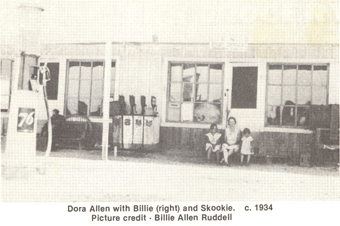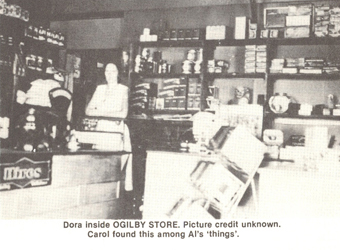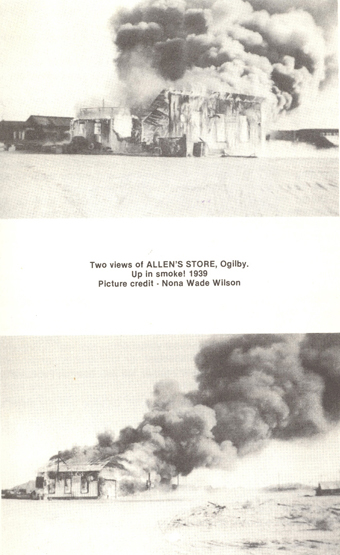Ogilby California, 1927 In the winter of 1927 the Allen family moved to the Ogilby desert. Due to asthma and lung trouble he was forced to leave his San Fernando home for an unknown future on the desert. He moved to Jackson Gulch with his wife and two small girls, ages 3 months and 3 years. Their first home was in a tent in Jackson Gulch. It was a life of outdoor cooking, hauling water miles, washing and bathing in a wash tub. After a few months, a move was made to Montgomery’s Store on the west side of the Southern Pacific tracks in Ogilby. The small town consisted of section houses for Mexican railroad workers, a small school which was a made over box car, and a very large railroad station. In about 1928, the Wilson Store was purchased and renamed ALLEN’S STORE. A post office was built adjacent to the store. We were to live in a house made of railroad ties, held together with mortar and whitewashed. It was said to have been a saloon in the gold rush days. The ceiling was canvas, nailed in large squares with lathing, which was also whitewashed and yellow with age. The flowing sand filled and sagged the squares, revealing several bullet holes in the ceiling. Our conveniences consisted of outhouses, kerosene stoves and flat irons. Our water was hauled in 50 gallon drums from a distance of about 10 miles. Wells on the desert produce salty water. Our ice was hauled by truck once a week from Yuma. Lights were generated by a Kohler plant, and our radio operated from a wet cell battery. Allen’s Store was very busy, serving the outlying desert mines. The American Girl Mine and the Tumco Cyanide Plant ran full force. Kenny Holmes worked the Cargo Muchacho mine. Weekly trips to Yuma stocked the store with canned goods and staples. The desert was dotted with homesteaders: Ashcrafts, Irvines, Walkers, and Van Zandts were just a few. Prospectors were grubstaked by Allen’s Store, some returned with gold and a few were never seen again. Allen and brother Joe prospected and mined in the Cargo Muchacho Mountains east of Ogilby, most of which was hopeful, but full of riches. An old stamp mill was purchased for $750 to process the ore which they trucked to Ogilby in small lots. It did not work satisfactorily and was eventually abandoned, a financial loss. Then came the stock market crash of 1929. The banks closed, the family’s savings were lost, and in those years, it was a small fortune. The following depression pushed the jobless and homeless out of the cities to the desert. They were encouraged to come and seek their fortune on the desert by a man who had a guest ranch about 25 miles north of Ogilby, Paul Lowe. People came from everywhere, looking for gold in thehills. They could trade their gold at the store for enough groceries and 5 gallons of gasoline to last a week, and at the end of that time, they would return for another week’s supply. There wasn’t much excitement in the desert except when they made movies at Buttercup Valley in the sand hills. One movie was Under Two Flags with Claudette Colbert. The freight train stopped in Ogilby to unload hundreds of Arab-dressed people including camels and lots of equipment, an unforgettable day. In the middle of the night in about 1932, the huge depot burned to the ground; we stood helpless and watched it burn, water was so scarce. A larger school replaced the small box car, there were more children in the area by then. All eight grades were taught in one room. I often went to school barefoot while my shoes were being repaired. Clothes were homemade from discards. Between the ages of 8 and 9, I earned spending money by making homemade pies and selling them for 25 cents, also washed and ironed shirts for 5-10 cents each. During the prohibition, one of the family outings took us to Algodones across the border in Mexico. The adults talked over pitchers of beer which cost 10 cents, while the children played in the streets and ate rolled tacos. There were only dirt roads in the town and very few cars. Our family separated and was to leave Ogilby in about 1938. Allen’s store was destroyed by fire in about 1939. The old saloon house in which we lived was also destroyed by fire sometime later. At some time after I left the desert, all the section houses were torn down, and now it seems that nothing had been there at all. Billie Allen Ruddel 5-6-80 (The following is handwritten on the last sheet) P.S. Marion LeRue Allen was my father. He was born on February 5, 1880 and died April 16, 1958. Note: |
|
OGILBY










